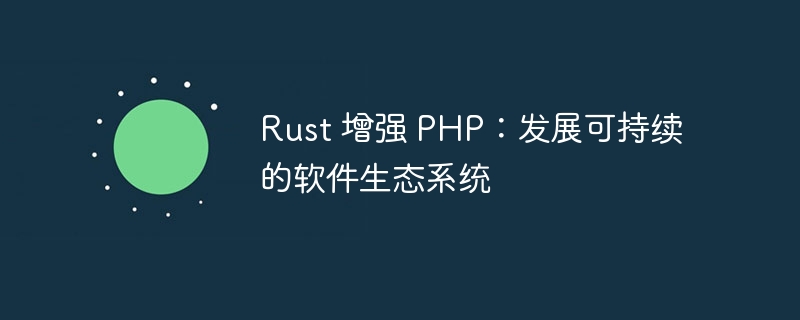

Rust-enhancing PHP: Developing a sustainable software ecosystem requires concrete code examples
Introduction
As modern software development continues to evolve, More and more developers are focusing on developing sustainable software ecosystems. In this process, more and more development languages have also appeared in our field of vision. Among them, PHP and Rust are two development languages that have attracted much attention. As a classic server-side scripting language, PHP is widely used in web development. As an emerging systems-level programming language, Rust is highly praised for its safety, concurrency and performance. This article explores how to use Rust to enhance PHP to grow a sustainable software ecosystem, and provides some concrete code examples.
1. Advantages of Rust
2. Use Rust to enhance PHP
With Rust, we can write PHP extensions to provide more Efficient and safe features. Here is a sample code:
#[allow(non_snake_case)]
#[no_mangle]
pub extern "C" fn php_my_extension_do_something() {
println!("This is a Rust function called from PHP extension.");
// TODO: Add your own code here
}In the above code, we use extern "C" and no_mangle to tell the Rust compiler to generate a C-compatible functional interface. This way, we can call this function in PHP.
Rust provides the ffi (Foreign Function Interface) function, which can interact directly with the C language. Through this feature, we can call PHP extension functions in Rust, and we can also call functions written in Rust in PHP. The following is a simple example:
extern crate libc;
#[link(name = "my_extension", kind = "static")]
extern "C" {
fn php_my_extension_do_something();
}
fn main() {
// 调用 PHP 扩展函数
unsafe {
php_my_extension_do_something();
}
}In the above code, we use the extern "C" keyword to declare the prototype of the php_my_extension_do_something function, and then call it through ffi.
3. Case Analysis
Suppose we are developing a web application with high concurrency requirements, but the performance bottleneck of PHP cannot meet the requirements. In order to improve the concurrency performance of the system, we can use Rust to write a separate background service. The following is a sample code:
use std::thread;
use std::sync::{Arc, Mutex};
fn handle_request() {
// 处理请求逻辑
// ...
}
fn main() {
let pool = Arc::new(Mutex::new(Vec::new()));
for _ in 0..10 {
let pool = Arc::clone(&pool);
thread::spawn(move || {
loop {
let mut pool = pool.lock().unwrap();
if let Some(request) = pool.pop() {
drop(pool);
handle_request(request);
} else {
break;
}
}
});
}
// 将请求放入线程池
for request in incoming_requests.iter() {
pool.lock().unwrap().push(request);
}
// 等待所有处理完毕
while pool.lock().unwrap().len() > 0 {
thread::sleep(Duration::from_secs(1));
}
}In the above code, we use Rust's multi-threading and mutex lock mechanism to implement a basic thread pool. After the request is put into the thread pool, each thread will take the request out of the thread pool for processing. This way, we can just be responsible for receiving requests in PHP and use Rust to do the actual processing in the background, thus improving concurrency performance.
Conclusion
This article explores how to enhance PHP by using Rust and develop a sustainable software ecosystem. By writing extensions to PHP, interacting with PHP, and providing concrete case studies, we can see the advantages of Rust in improving PHP's security, performance, and concurrency. Hopefully these code examples will help developers better understand how to use Rust to enhance PHP and achieve better results in actual development.
The above is the detailed content of Rust Powers PHP: Developing a Sustainable Software Ecosystem. For more information, please follow other related articles on the PHP Chinese website!




